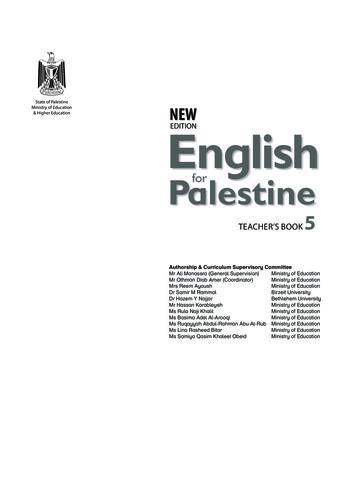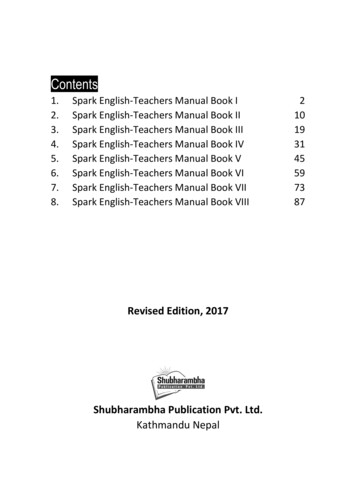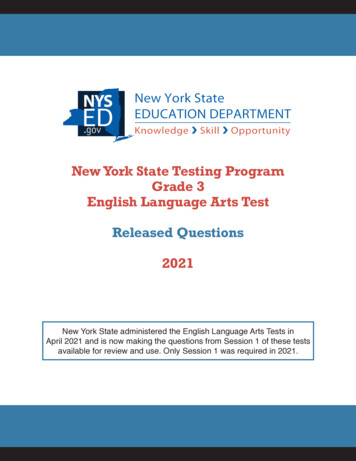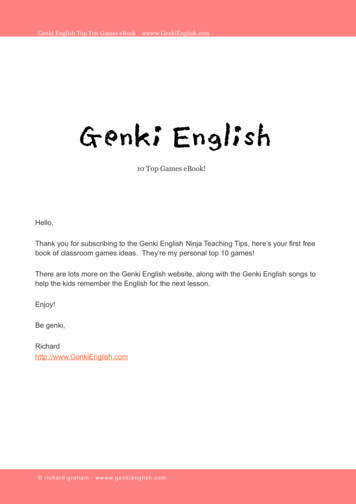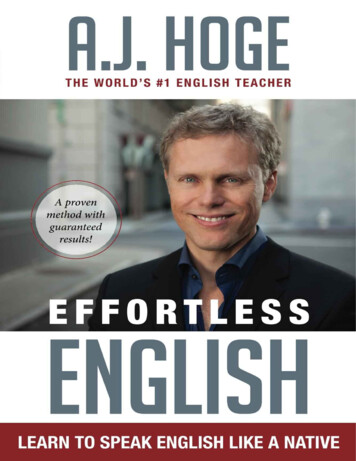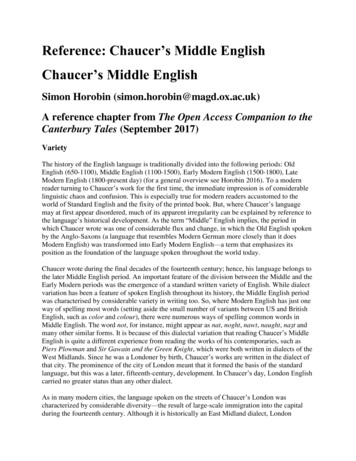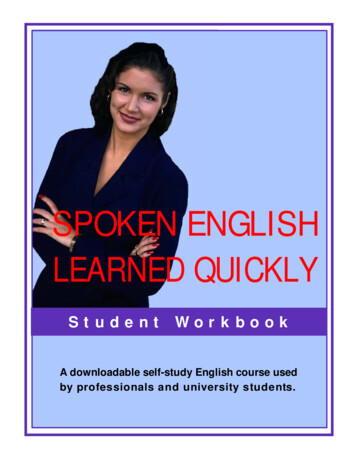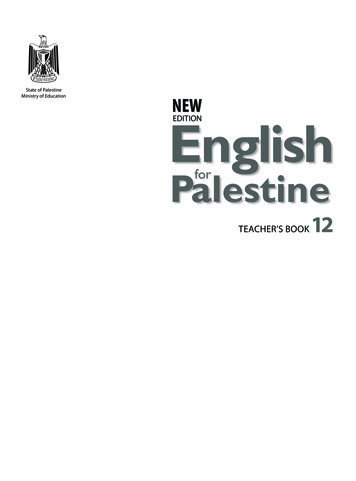
Transcription
State of PalestineMinistry of EducationNEWEDITIONEnglishPalestineforTEACHER’S BOOK12
Authorship & Curriculum Supervisory CommitteeMr Ali Manassra (General Supervision)Ministry of EducationMrs Reem Ayoush (Coordinator)Ministry of EducationMr Othman Diab AmerBirzeit UniversityDr Samir M RammalBirzeit UniversityDr Hazem Y NajjarBethlehem UniversityMs Rula Naji KhalilMinistry of EducationMr Hassan KarableyehMinistry of EducationMrs Ruqayyah Abdul-Rahman Abu Al-RubMinistry of EducationMr Yahia TenihMinistry of EducationMrs Oraib Ramadan KhammashMinistry of EducationAuthorship Supervisory Committee (original edition)Dr Hazem Y Najjar (Head)Bethlehem UniversityDr Salem AweissBirzeit UniversityDr Omar Abu Al-HummosAl-Quds UniversityMr Othman Diab Amer (Rapporteur)Ministry of EducationEnglish Language Curriculum Team (original edition)Dr Hazem Y NajjarBethlehem UniversityDr Salem AweissBirzeit UniversityDr Omar Abu Al-HummosAl-Quds UniversityDr Odeh J OdehAl-Najah UniversityDr Samir M RammalHebron UniversityDr Nazmi Al-MasriGaza Islamic UniversityMs I’tidal Abu HamdiyahMinistry of EducationMs Majedah DajaniMinistry of EducationMr Imad JabirHebron UniversityMr Suhail MurtajaMinistry of EducationMr Othman Diab Amer (Rapporteur)Ministry of Education2
ContentsIntroduction . . . . . . . . . . . . . . . . . . . . . . . . . . . . . . . . . 4Course components . . . . . . . . . . . . . . . . . . . . . . . . . . . 4Methodology1 Reading in Grade 12 – developing independent readers2 Grammar in Grade 12 – the Discovery Technique . . . . .3 Vocabulary in Grade 12 . . . . . . . . . . . . . . . . . . . . .4 Pair and group work . . . . . . . . . . . . . . . . . . . . . . .6666Classroom management1 The importance of pace . . . . . . . . . . . . . . . . . . . . . . . . .2 Giving instructions . . . . . . . . . . . . . . . . . . . . . . . . . . . . .3 Independent learners . . . . . . . . . . . . . . . . . . . . . . . . . . .4 Self-monitoring . . . . . . . . . . . . . . . . . . . . . . . . . . . . . .7777Preparation checklist . . . . . . . . . . . . . . . . . . . . . . . . . . . 7Language overview . . . . . . . . . . . . . . . . . . . . . . . . . . . . 8Teacher’s notesPupil’s Book 12Unit 1 A new start . . . . . . . . . . . . . . . . . . . . . . . . . . . .11Unit 2 Under pressure . . . . . . . . . . . . . . . . . . . . . . . . . . . 16Unit 3 A funny thing happened . . . . . . . . . . . . . . . . . . . 21Progress test 1 . . . . . . . . . . . . . . . . . . . . . . . . . . . . . .26Unit 4 The shrinking world . . . . . . . . . . . . . . . . . . . . . . . . 28Unit 5 Making friends . . . . . . . . . . . . . . . . . . . . . . . . . . . 33Unit 6 Revision (Units 1–5) . . . . . . . . . . . . . . . . . . . . . . . . 38Unit 7 The world of work . . . . . . . . . . . . . . . . . . . . . . . . . 42Unit 8 In business . . . . . . . . . . . . . . . . . . . . . . . . . . . . . .47Unit 9 Only a game? . . . . . . . . . . . . . . . . . . . . . . . . . . . . 52Progress test 2 . . . . . . . . . . . . . . . . . . . . . . . . . . . . . 57Unit 10 Who am I? . . . . . . . . . . . . . . . . . . . . . . . . . . . . 59Unit 11 Different places, different ways . . . . . . . . . . . . . . . . 64Unit 12 Revision (Units 7–11) . . . . . . . . . . . . . . . . . . . . . . 68Pupil’s Book 12 Reading PlusUnit 1 Making changes . . . . . . . . . . . . . . . . . . . . . . . . . . 73Unit 2 Fitting in . . . . . . . . . . . . . . . . . . . . . . . . . . . . . . .79Unit 3 The global village . . . . . . . . . . . . . . . . . . . . . . . . . .85Literature A Romeo and JulietProgress test 1 . . . . . . . . . . . . . . . . . . . . . . . . . . . . . . .91Unit 4 Money talks . . . . . . . . . . . . . . . . . . . . . . . . . . . . .93Unit 5 Winners and losers . . . . . . . . . . . . . . . . . . . . . . . . .99Unit 6 Past history? . . . . . . . . . . . . . . . . . . . . . . . . . . . . 104Literature B Romeo and JulietProgress test 2 . . . . . . . . . . . . . . . . . . . . . . . . . . . . . . 109Practice test – Semester 1 . . . . . . . . . . . . . . . . . . . . . . . 111Practice test – Semester 2 . . . . . . . . . . . . . . . . . . . . . . . 119End of year Reading Plus test . . . . . . . . . . . . . . . . . . . . 1283
IntroductionCourse componentsThe English for Palestine Grade 12 package consists of thefollowing components: 1 Pupil’s Book 1 Reading Plus Book 1 Teacher’s Book, covering Pupil’s Book and ReadingPlus Book 1 audio CDObjectivesThe objectives of Grade 12 are: expanding the pupils’ active and passive vocabulary revisiting and expanding previously seen grammar developing the key language skills of reading, writing,speaking and listening developing the analytical, critical and evaluative skills of thepupils preparing the pupils to use English in the world beyond theclassroomFor details of how the course covers language unit by unit, seethe Overview on pp. 8–10.English for Palestine Grade 12 – approach and contentsEnglish for Palestine Grade 12 has two books: English for Palestine Pupil’s Book 12. This is the corelanguage book, to be used for all courses. English for Palestine Pupil’s Book 12 Reading Plus. This is theadvanced literary book, which is an additional componentfor more intensive English courses.Each unit is based on a theme, allowing the new language tobe taught in context, e.g. making a new start, under pressure,coincidences. The theme in each unit of Pupil’s Book 12 ismirrored in a related theme in Pupil’s Book 12 Reading Plus.The themes have been taken from the Palestinian curriculumto meet the needs and interests of pupils of this age.Unit 6 and Unit 12 are review units: no new vocabulary orlanguage is introduced in them. Instead, the previously seenvocabulary and language is practised using the same format ofreadings, discussions, practice activities, writing and integratedskills work.The fours skills of reading, writing, speaking and listeningare integrated in both sections of the course, but there is anemphasis on a particular skills area in each period.The course uses many of the teaching techniques of previousgrades, but develops and expands them in line with the pupils’age and abilities. The use of standard rubrics makes it easy forthe teacher to recognise the purpose of each activity and toteach it effectively.4In addition, the course aims to develop the analytical,critical and evaluative skills of the pupils. In all units they areencouraged to examine issues, identify key ideas, express theirown opinions, listen to the opinions of others, and often toreach a group consensus.There are progress tests in both English for Palestine 12 Books,after Unit 3 and Unit 6. In the core-language book, these teststake up three periods, with sections for Reading, Vocabularyand Language study, and Writing. In the Reading Plus Book,these tests take up two periods: Period 1 covers Reading, andVocabulary and Language Study, and Period 2 has a sectionbased on the literary reader, and a Writing section. Thesetests will help to identify language items or skills that are stillcausing difficulties, so that the teacher can help the pupils withproblem areas before the formal exams.In addition, there are three model tests in this Teacher’s Book:Practice test – Semester 1; Practice test – Semester 2; Endof year Reading Plus test. These tests will help to identifylanguage items or skills that are still causing difficulties, so thatthe teacher can help the pupils with problem areas before theformal exams.Pupil’s Book 12 – the layout of the unitsWith minor variations, the units of the core-language book arearranged as follows:Period 1 and Period 2 (Reading and comprehension)Period 1 is a two-page spread which introduces the maintheme of the unit. There is always a reading text about thetheme of the unit; it includes the new vocabulary and the newlanguage of the unit, and there are associated comprehensionand discussion activities.All new vocabulary in Grade 12 is presented in context, inreading passages. This is in contrast to previous grades, wherethe vocabulary was presented separately, in isolation, at thestart of the period. One important advantage of presentingnew vocabulary in context at this grade is that it encouragesthe pupils to develop the skill of guessing meaning.Generally, Period 1 starts with the teacher introducing the skillof guessing meaning through contextual clues, the theme ofthe unit, and the pupils then discussing various questions ortopics related to this. After that, the pupils read the text anddo a comprehension activity related to it. Finally, there areactivities associated with the new vocabulary of the unit: forexample, the pupils may find the new words in the text, thenmatch them with their meanings; or they may replace wordsand phrases in sentences with new words from the text.
Period 2 is another two-page spread which continues thetheme of the unit. Period 2 starts with a reading text followedby comprehension questions; there may also be a secondreading text and comprehension questions. After this, thereare vocabulary activities as in Period 1.Period 3 and Period 4 (Language and vocabulary study)This period introduces the language and vocabulary study,and it usually covers a bit more than one page. It generallystarts with examples of the new language of the unit. Theseare presented in a green box for easy recognition. The pupilsare then helped to work out the grammar rules associated withthe new language. When they are clear about the rules, theygo on to do grammar practice activities.In some cases, the new language is part grammar, partvocabulary: for example, the use of prefixes and suffixes andhow they change meaning, or the difference in meaning of arange of linking words. This type of new language is alwayspresented in the green boxes described above, together withsentences about meaning for the pupils to work out. However,there are also some examples of vocabulary activities similar tothe activities in Period 1 and Period 2.Period 5 and Period 6 (Integrated Skills / Writing )The audio CDThe audio CD contains native-speaker recordings of all thelistening texts and dialogues in the Pupil’s Book, to give a clearmodel for all language structures, key vocabulary and lettersounds. The recordings are designed to encourage the pupils’input, giving them plenty of opportunity to develop theirlistening and speaking skills.Pupil’s Book 12 Reading Plus – the layout of the unitsAs the name suggests, the emphasis in this book is on reading.However, the other skills are also developed, along withvocabulary and language.With minor variations, the units of the Reading Plus Book arearranged as follows:Period 1 (Reading and comprehension)This page features the first reading text, which introduces thetopic of the unit. There are a range of comprehension anddiscussion activities for the text. These often involve aspects ofanalytical and critical thinking about the topic of the text.Period 2 and Period 3 (Reading and comprehension /Vocabulary and reading skills)These two periods feature the ‘language in use’ section of eachunit. The pupils are given a range of practical tasks, involvingspeaking, reading, listening and writing, which reflect the waythat English is used in the real world, outside the classroom.These two periods feature a longer reading text. The activitieswhich follow it develop reading skills, but also focus on thevocabulary in the text. The pupils are encouraged to use thecontext to work out the meaning of unfamiliar words. Theythen use these words in a variety of practice activities.In these tasks, the pupils are required to use the languagethey have learned in the unit. The periods use an integratedskills approach, again reflecting the way that English is usedin real situations. The two periods always contain at least onesubstantial writing task.The activities also help the pupils to examine and understandthe structure of the text. The aim is to help the pupils toproduce texts in a similar style later in the unit. In some units,the pupils also isolate the important information in the text,and then they are guided to writing summaries.The second part of Period 6 is the Unit summary, whichencourages the pupils to consider what they have learned andwhat they have achieved in each unit. It also guides the pupilsto awareness of how they can maximise their progress.Period 4 and Period 5 (Reading and comprehension /Vocabulary and reading skills)The Unit summary is also designed to be a useful referencesection for navigating the book during revision times.These two periods follow the same pattern as Period 2 andPeriod 3, with another longer reading text and activities thatexpand on it.The Teacher’s BookPeriod 6 and Period 7 (Writing / Writing skills)Comprehensive notes are supplied for each period, to ensurethe teaching is as effective as possible and that teaching timeis used efficiently. The notes for each unit contain a summarybox at the start, clearly detailing the learning aims and thekey language areas covered, as well as listing the materialsrequired so that you can prepare lessons in advance. Timingsfor each activity are supplied as a guide.These two periods focus on writing skills. The pupils are takenthrough a sequence of pre-writing activities, drafting activitiesand revision activities. These activities focus on process ratherthan content, and pupils are encouraged to develop andexpress their own ideas and opinions in the writing tasks.Also included are full instructions for carrying out the activitiesin class, answer keys and audioscripts for the listeningactivities.This is the literature period. In both Units 1–3 and Units 4–6,the literary reader is Shakespeare’s famous play Romeo andJuliet. One purpose of this feature is simply to read extractsfrom the play, answer comprehension questions about themPeriod 8 (Literature)5
and enjoy them. However, the pupils are also encouraged toreact to the play extracts, to express their opinions about themand to discuss aspects of them in groups.Methodology1 Reading in Grade 12 – developing independent readersIn both sections of the Pupil’s Book, a large part of the course isdedicated to developing reading skills.In order for the pupils to become independent readers, it’simportant to establish a few rules at the beginning of thecourse.There should be a limit to the number of questions which thepupils can ask about a text. If there is no limit, the pupils willwaste a large part of the class asking questions which theyshould be able to answer themselves. By limiting the numberof questions to perhaps three or four for the whole group,the pupils will be obliged to start understanding the text bythemselves – an essential part of becoming independentreaders.It may be that the pupils find the idea of understanding atext by themselves impossible. This would be the unfortunateresult of the way they have been taught previously, withteachers spending large amounts of class time explainingtexts. To overcome this, choose three or four words from eachtext and explain their meaning before the pupils start to read.By doing this, it becomes easier for the pupils to guess themeaning of the remaining unknown words from the context.Remember that Grade 11 and Grade 12 are the last chance thatthe pupils have to become independent readers. It’s vital thatthey are taught in a way that develops the necessary skills andattitude.2 Grammar in Grade 12 – the Discovery TechniqueGrammar plays a key role in the process of learning a language.In each of the units in Grade 12, Period 3 and 4 present andpractise new grammar points.The pupils are not given explicit rules about how the structureis made or what it means. Instead, first they are given examplesentences using the grammar point (in the green boxes on theLanguage and vocabulary study pages). Then they complete aset of sentences that talk about the structure and the meaningof the grammar point. By looking at the examples in the greenbox and reflecting on the meanings, the pupils are able tocomplete these grammar rules. These rules build up during thecourse into a self-constructed grammar manual of English.This is learning by the ‘Discovery Technique’, and it helps thepupils to become independent, confident learners. It is animportant part of the course, and it should not be replacedby explanations given to the pupils by the teacher. As with6reading in Grade 11 and Grade 12, the pupils are beingprepared to use English after they have left school, andlearning to be independent is a vital part of this.Note that, to use this Discovery Technique effectively, thepupils will need to be familiar with very basic grammarterminology: the concept of subject and object in a sentence,the names of parts of speech (noun, verb, adjective, adverb,preposition), the names of the verb tenses and voices in English(present simple, present continuous, present perfect etc, activeand passive), and the names of sentence types (zero / first/ second / third conditional, clause etc). In depth, advancedgrammatical knowledge is not necessary: the DiscoveryTechnique focuses more on understanding meaning and howlanguage is used.3 Vocabulary in Grade 12Throughout the course, the pupils are encouraged to expandtheir vocabulary. As mentioned earlier, in Grade 12 vocabularyis presented in context, as part of a reading text. Whereverpossible, when the pupils ask what a word in a passage means,they should be encouraged to try to work out the meaningfrom the context. This helps them to develop the essentialskill of guessing meaning, as well as encouraging the pupils tobecome independent learners, and to rely less on the teachers.4 Pair and group workThe most effective way to practise speaking skills is to use pairor group work. In large classes, it is the only way to ensure thatthe pupils have adequate speaking practice.Good classroom management is the key to pair and groupwork. The pupils must be familiar with the routines: forexample, for pair work they should turn to the pupil on theright (or left); for group work, pairs in alternate rows shouldturn round and work with the pair behind them. Establishthese routines at the beginning of the course.While the pupils are speaking, always go round the class toensure that they are doing the activity correctly, and thatthey are speaking in English. This is a good way of monitoringpupils’ progress, but remember that speaking is largely afluency activity. Inevitably the pupils will make some mistakes,but avoid interrupting the group if they are talking fluently.Let them practise more; the corrections can be done after theactivity.After pair and group work, always arrange a feedback sessionwhere one pupil of each pair or group, the spokesperson, tellsthe class about what they said.
Classroom management1 The importance of paceThe teacher’s pace is a vital aspect of the ELT class. If theteacher is going too fast, the pupils will become confused andthey will not be able to practise enough. If the teacher is goingtoo slowly, the pupils will get bored and stop paying attention.Ideally, each activity should be done at a pace that makes itinteresting and keeps the pupils ‘on their toes’, but which givestime to understand, ask questions and practise the language.For each set of instructions for each activity in the Teacher’sBook, there is an indication of roughly how long it should take,in minutes. This is only a rough guide; you must also take intoaccount the abilities of the group as a whole, the time of day,your energy levels, etc.The pace of each activity will vary to suite the pupils’ needs. Tryto ensure a variety of pace, challenge and focus in each class:some fast, lively activities, and some slower, more reflectiveones; some activities that are easy and some that are morechallenging; some activities where the focus is on the teacherand some where the pupils are working in pairs or smallgroups.2 Giving instructionsAs far as possible, keep instructions to a minimum. Ademonstration of an activity, using one of the better pupilsin the class, is much more effective than detailed instructionswhich many pupils will find difficult to follow.Try to encourage pupils to read the rubrics themselves, thenask one of them to read it out to the class. You can then elicitmeaning, helping if needed. The rubrics in Grade 12 have beenstyled to detail important instructions, and they sometimescontain added information about, for example, a reading text.3 Independent learnersIn Grade 12 pupils are expected to take an increasingly activerole in their own learning. The pupils’ notebooks are a keypart of this. Ideally, they should have sections for vocabulary,grammar and expressions. In these sections they should recordnew language items as they occur in the class. Encourage thepupils to: keep their notebooks up to date use word families and word networks in the vocabularysection write the details of new grammar point (for example, thenames of a tense, example sentences and notes on how it isused) in the grammar section record expressions and other language in the expressionssectionThe teacher should also encourage the pupils to use thewordlists and the grammar reference at the end of the Pupil’sBook.Awareness is another important aspect of learner training:the pupils should be encouraged to reflect on the progressthey are making, on the language points they feel confidentwith, and on the language points which they need to practisefurther. The Unit summary at the end of each unit helps andencourages them to do this.4 Self-monitoringUse this checklist every time you teach. Look at A Preparationchecklist before you go into the classroom. Look at B Selfevaluation after the class.A Preparation checklistYesNoYesNo1 Have I read the Teacher’s Book beforethe lesson?2 Do I need to listen to the CD?3 Do I know the track number of the CD?4 Have I looked at what we did last lesson?5 Do I know the language purpose ofthe lesson?6 Have I considered any particular needsof the pupils?7 Have I thought about the timing ofmy lesson?8 Have I allowed time for questions andfavourite activities?B Self-evaluation1 Did the CD work?2 Did each pupil have an opportunity topractise the language?3 Did the pupils use a variety of skills?4 Did I cover all the material Iintended too?5 Was my lesson well-timed andwell-balanced?6 Did most pupils appear to understandthe lesson?7 Have I taken note of anything specialwhich I need to cover next time?8 Was the lesson appropriate and successful?7
English for Palestine Grade 12 Language overviewPupil’s BookUnitLanguage and vocabulary studyIntegrated skills/Writing1 A new startPresent simple / perfectPresent continuous‘Stative’ verbsbe / get used to, confident, creative, excuse,factor, field, foundation course, like-minded,on show, optional, participate (in), potential,routine, set, stuck, zoneReading for gist; Reading for specificinformationDiscussing interests; Discussing comfortzonesHearing about university lifeCompleting a university application form2 Under pressureInfinitives and -ing formsCompound noun phrases with onPredicting content; Identifying the mainpoint; Reading for specific information;Reading and assessing a personalstatementDiscussing problems and concernsHearing advice about writing personalstatementsPlanning and drafting a personal statement14Reading about coincidenceDiscussing funny stories; Discussing routineeventsPredicting content based on pictures;Hearing about an interview andcoincidenceWriting a story from a recountWriting a story about a coincidence ormisunderstanding24aware (of), convinced, disappointed, fees,inevitable, nowadays, persevere,patient / impatient, personal, point, priority,revise / revision, reward3 A funny thinghappenedPast tensesUsing prefixes co- and misUsing time phrases and pronouns forcohesionbald, catch up (with someone),coincidence, colleague, come across, error,(un)intended, keep in touch, knowledge,mention, misunderstanding, pat,put (someone) up, reluctant, run into, straight,stranger, the latter, turn outProgress test 14 The shrinkingworldModal verbs of probability and possibilityFuture statements using willOther forms of the futureUsing -ing forms and participles asadjectives‘Reduced’ relative clauses with active orpassive meaningsPhrasal verbs on and outacquaintance, boast, claim, extreme,genuine, guarantee, happen to (be / do),impress, in common, in confidence,inflexible, initial, lasting, nature, regard (as),roughly, via6 Revision(Units 1–5)8434addicted (to), border, capable, citizen, fear,hub, justified, motivated, network, panic,potential, questionnaire, remote, restrictions,shrink, trend, vary5 Making friendspageComparing texts about communication;Predicting and analysing opinions;Reading about questionnaire resultsDiscussing communication in the future;Discussing the futureHearing about a questionnaire; Usinginformation to complete a questionnairePlanning, writing and conducting aquestionnaire38Comparing text types; Identifying tips aboutfriendship; Reading and correcting aninformal letterDiscussing friendship types; Discussingadvantages and disadvantages ofcommunication methodsHearing about advantages anddisadvantages of communicationmethodsPlanning and writing an essay aboutcommunication methods4858
UnitLanguage and vocabulary studyIntegrated skills/Writing7 The world ofworkDirect and indirect questionsQuestions tagsNegative questionsIdentifying subject and objectIdentifying text types and themes; Analysinga formal letter; Choosing a conclusionDiscussing dream jobs; Discussing schoolas preparation for the futureHearing about work experiencePlanning and writing a general enquiry letter68Reading about business; Understanding thesteps to start a business; Analysing abusiness letterDiscussing a new business; Discussing howto be successful in businessHearing about a business transactionWriting a short formal email78Read about salaries in sport; Read about theOlympic GamesDiscussing salaries in sport; Discussingsports in the Olympic Games; Discussingregrets and decisionsHear about a football match; Compare anaudio with a newspaper reportWrite a personal email; Plan and write areport of a sporting event88charity, co-ordinated, controversial,employment, fantasy, job security, make aliving, neglect, outweigh, prospects, reveal,stage fright, throughout, worth8 In businessReporting advice and ordersNoun phrases made from phrasal verbsCausative structuresPhrases with in or on nounattempt, breakthrough, currently, distribute,graphic, humanitarian, lack, marketing,market share, market value, returns, run,sector, up market9 Only a game?Past wishes and regretsshould(n’t) have past participlePrefixes over- and underamateur, astonishing, combination, criteria,drop, get on (with), infuriated, judge,objective, promising, reserve, rule out,terror, tragedy, trialProgress test 210 Who am I?98Countable and uncountable nounsDefinite and indefinite articlesappeal, at all costs, bring up / upbringing,commerce, conform, consumption, identity,image, implications, loyal / loyalty,manufacturing, peers, perceptions,psychology, selfish / selfishness, strategy11 Different places,different wayspageVerbs and prepositionsModal verbs with infinitives for present meaningsPast forms of modal verbsLinking words and phrasesaccent, accustomed, cling (onto), committed,conviction, essential, expatriate, fellowcountrymen, fluent, object (to), puzzle,stubborn, unconsciouslyComparing text types; Reading aboutbrands; Choosing a text summaryDiscussing identity; Discussing quotationsabout identity; Discussing brands;Discussing revisionHearing about studying and revisionPlanning and writing a summary102Reading about Palestinian culture;Comparing culturesDiscussing cultures and living in othercountries; Discussing memories and thepast; Discussing the first day of schoolHearing about someone’s first day of schoolWriting about a memory; Writing about astory of a memorable event11212 Revision(Units 7–11)122Wordlist133Grammar reference135Writing samples1399
English for Palestine Grade 12 Language overviewPupil’s Book Reading PlusTitleTopics and ContextsWriting1 Making changes Rewriting a letterReplying to a letterWriting resolutions2 Fitting in The importance of belonging and fitting in(or not fitting in) Online communities Fixed phrases ‘Black sheep’ Understanding idioms and proverbs Sentence linking phrasesWriting a noticeWriting a welcome page fora community website183 The global village Writing a paragraphshowing the opposite ideaPlanning a paragraphCompleting an essay32The history and effects of globalisationArguments for and against globalisationPositive and negative connotations and opinionsCombining opposite ideasThe use of topic sentences in paragraphsJoining sentences into paragraphs4Literature A: Romeo and Juliet46Progress test 1 (Units 1–3)524 Money talks 5 Winners and losers6 Past history?Writing a formal letterCompleting a proposalformComparing formal andinformal writing56 Attitudes to winning and losing Comp
English for Palestine Grade 12 has two books: English for Palestine Pupil’s Book 12 . This is the core-language book, to be used for all courses . English for Palestine Pupil’s Book 12 Reading Plus . This is the advanced literary book, which is an additional compon
